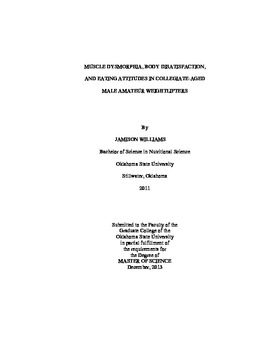| dc.contributor.advisor | Shriver, Lenka | |
| dc.contributor.author | Williams, Jamison David | |
| dc.date.accessioned | 2015-06-17T20:08:37Z | |
| dc.date.available | 2015-06-17T20:08:37Z | |
| dc.date.issued | 2013-12-01 | |
| dc.identifier.uri | https://hdl.handle.net/11244/15190 | |
| dc.description.abstract | Muscle Dysmorphia (MD) is a growing problem in men in western society. Although the causes of MD remain unknown, this condition is most prevalent among men engaging in competitive bodybuilding and weightlifting. However, there is a lack of studies with younger recreational male weightlifters and bodybuilders. The purpose of this study was to examine prevalence of signs and symptoms of MD and disordered eating among young college-aged males. A convenience sample (n=38) of male members of the university weightlifting club agreed to participate in this study. Height, weight, and body fat were measured and used to calculate Body Mass Index and Fat-Free Mass Index. Participants also completed a survey packet that included the Muscle Dysmorphia Disorder Inventory (MDDI), Eating Attitudes Test (EAT), and Bodybuilder Image Grid (BIG). A cutoff score of 39 on the MDDI was used to classify study participants as dysmorphic or non-dysmorphic. A score of 11 on the EAT was used to classify study participants as 1) having signs of disordered eating and 2) no signs of disordered eating. The BIG, which is a grid of males varying in muscularity and body fat levels, was scored on both desired changes in muscularity and body fat. MDDI and EAT scores had a positive significant association (r=.50, p<0.01). Driver for Size, Appearance Intolerance, and Functional Impairment subscales of the MDDI and Dieting, Bulimia and Food Preoccupation, and Oral Control Subscales of the EAT had positive significant associations. Subjects classified as "dysmorphic" based on the MDDI scores had significantly higher scores on the EAT than "non-dysmorphic" subjects. Regression analysis revealed that two MDDI items 12 "I feel depressed when I miss one or more workouts days" and 1 "I think my body is too small" accounted for 80.1% of the variance of MDDI scores. This study suggests that collegiate-aged males involved in recreational weightlifting may be at higher risk for developing MD and patterns of disordered eating than previously believed. | |
| dc.format | application/pdf | |
| dc.language | en_US | |
| dc.publisher | Oklahoma State University | |
| dc.rights | Copyright is held by the author who has granted the Oklahoma State University Library the non-exclusive right to share this material in its institutional repository. Contact Digital Library Services at lib-dls@okstate.edu or 405-744-9161 for the permission policy on the use, reproduction or distribution of this material. | |
| dc.title | Muscle Dysmorphia, Body Dissatisfaction, and Eating Attitudes in Collegiate-aged Male Weightlifters | |
| dc.type | text | |
| dc.contributor.committeeMember | Smith, Doug | |
| dc.contributor.committeeMember | Betts, Nancy M. | |
| osu.filename | Williams_okstate_0664M_13195.pdf | |
| osu.accesstype | Open Access | |
| dc.description.department | Nutritional Science | |
| dc.type.genre | Thesis | |
| dc.subject.keywords | body dissatisfaction | |
| dc.subject.keywords | collegiate | |
| dc.subject.keywords | eating attitudes | |
| dc.subject.keywords | male | |
| dc.subject.keywords | muscle dysmorphia | |
| dc.subject.keywords | weightlifters | |
